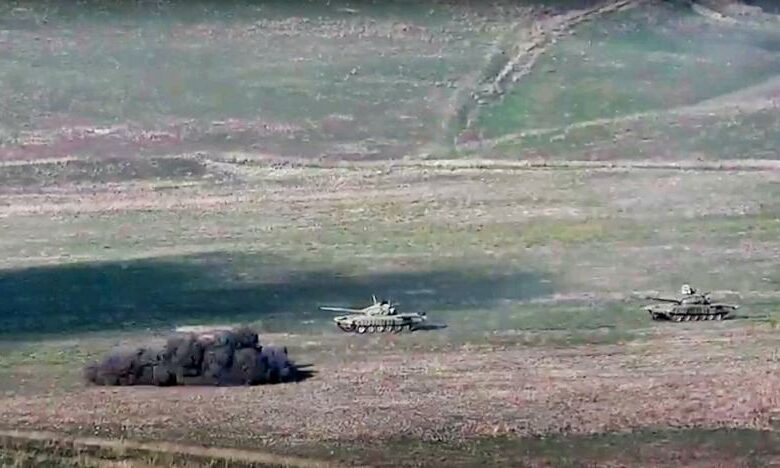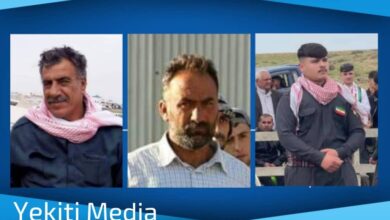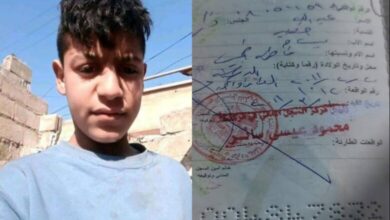
Armenia Says Turkey Sent 4,000 Syrian Fighters to Azerbaijan amid Fighting
Yekiti Media
Armenia’s ambassador to Russia said on Monday that Turkey had sent around 4,000 fighters from northern Syria to Azerbaijan amid fighting over the breakaway region of Nagorno-Karabakh, the Interfax news agency reported.
The ambassador said the fighters were taking part in fighting in Nagorno-Karabakh, a region inside Azerbaijan that is run by ethnic Armenians, the RIA news agency reported.
Turkey is a close ally of Azerbaijan.
The Armenian foreign ministry also accused Turkey on Monday of providing direct military support for Azerbaijan.
In a statement, it said Turkey had a “direct presence on the ground”. It said Turkish military experts “are fighting side by side” with Azerbaijan, which it said was also using Turkish weapons including drones and warplanes.
Azerbaijan denied the allegations. There was no immediate reaction from Turkey.
Armenian and Azeri forces exchanged fierce fire for a second day on Monday, with the sides accusing each other of using heavy artillery amid reports of at least 21 deaths and hundreds of people being wounded.
Turkish President Recep Tayyip Erdogan said on Monday Armenia must immediately withdraw from territory he said it was occupying in Azerbaijan, and it was time to end a crisis over the breakaway region.
“It is time to end the crisis in the region, which started with the occupation of Nagorno-Karabakh. The region will once again see peace after Armenia immediately withdraws from the Azeri lands it is occupying,” Erdogan told an event in Istanbul.
He said the Minsk group – which is led by Russia, France and the United States and mediates between Armenia and Azerbaijan – had failed to solve the issue for almost 30 years.
Azerbaijan “had to take matters into its own hands whether it likes it or not,” Erdogan said. “Turkey will continue to stand with…Azerbaijan with all its resources and heart.”
He did not directly address whether Turkey was currently playing an active role in the conflict.
Earlier, Turkish Defense Minister Hulusi Akar said Armenia must send back foreign “mercenaries and terrorists” to achieve stability in region.
The clashes, the heaviest since 2016, have rekindled concern over stability in the South Caucasus region, a corridor for pipelines carrying oil and gas to world markets.
The two former Soviet republics have clashed periodically in a decades-long conflict over Nagorno-Karabakh.
Azerbaijan’s president declared a partial military mobilization, and his foreign minister said six Azeri civilians had been killed and 19 injured since the fighting began. Interfax news agency quoted an Armenian defense ministry representative as saying 200 Armenians had been wounded.
Nagorno-Karabakh reported that 15 more of its soldiers had been killed. It had said on Sunday 16 of its servicemen had been killed and more than 100 wounded after Azerbaijan launched an air and artillery attack.
Nagorno-Karabakh also said it had recovered some territory that it had lost control of on Sunday, and said Azerbaijan had been using heavy artillery to shell areas.
Azerbaijan’s defense ministry said Armenian forces were shelling the town of Terter.
China and Russia urged both sides to show restraint.
Under international law, Nagorno-Karabakh is recognized as part of Azerbaijan. But the ethnic Armenians who make up the vast majority of the population reject Azeri rule.
They have run their own affairs, with support from Armenia, since Nagorno-Karabakh broke away from Azerbaijan in a conflict that erupted as the Soviet Union collapsed in 1991.
Although a ceasefire was agreed in 1994, after thousands of people were killed and many more displaced, Azerbaijan and Armenia frequently accuse each other of attacks around Nagorno-Karabakh and along the separate Azeri-Armenian frontier.
Pipelines shipping Caspian oil and natural gas from Azerbaijan to the world pass close to Nagorno-Karabakh.
At least 200 people were killed in a flare-up of the conflict between Armenia and Azerbaijan in April 2016. At least 16 people were killed in clashes in July.
aawsat




